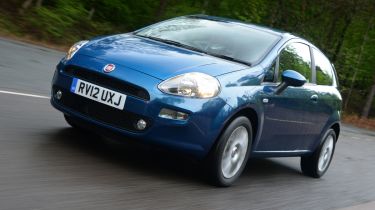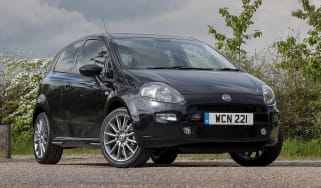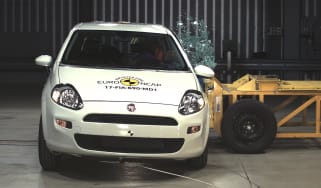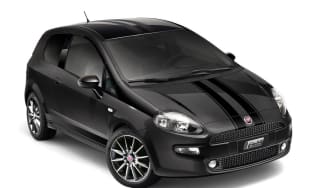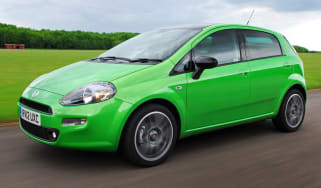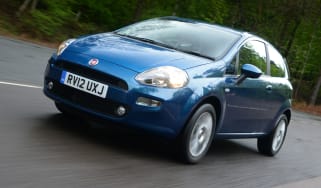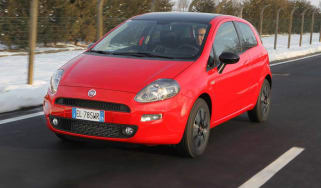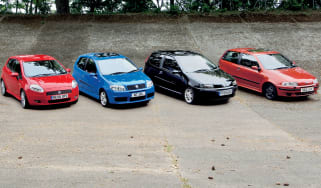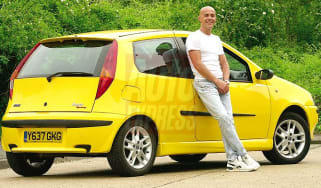Fiat Punto (2012-2018) review
Old school engineering and a less than thrilling drive make the Fiat Punto hard to recommend

The Fiat Punto has been around for donkey’s years – since 2005 in fact – and it shows in almost every facet of the car’s design and performance. It’s rather bland looking, is not particularly competitive with newer rivals for emissions or economy, and its engineering and technology feels past the ‘best before’ date.
While the Punto’s relatively practical packaging, reasonable safety credentials, decent kit list and a smooth ride have some appeal, they ultimately fail to compensate for the car’s lacklustre handling and dated underpinnings. Superminis may be mostly bought for their practicality and cost-effectiveness, but the best ones are also good fun to drive – and the current generation Punto just isn’t.
The Fiat Punto for sale today has little of the lustre that its predecessors attracted. When the model first landed at UK dealers in 1994 it was an instant hit, and then it went on to trump the Volkswagen Polo by clinching the European Car of the Year Award.
Over successive years Fiat made hay with standard models and fun versions like the Punto GT and Punto Sporting, but as competition in the supermini sector hotted-up it all started going a bit wrong. By 2005 Fiat had its knickers properly in a twist, confusingly naming versions of the third generation car the Grande Punto and Punto Evo, before seeing the error of its ways and reverting to simply Punto again in 2012. Even Punto Abarth versions had failed to return the magic, and as a result the Punto 2017 range is a shadow of its former self.
Used - available now

2018 MINI
5-Door Hatch
35,580 milesAutomaticPetrol1.5L
Cash £11,995
2026 Audi
Q2
19,006 milesAutomaticPetrol1.5L
Cash £21,497
2024 Volvo
V60
53,407 milesAutomaticPetrol2.0L
Cash £23,187
2024 Volkswagen
Tiguan AllSpace
51,951 milesAutomaticPetrol1.5L
Cash £19,597Fiat, which is doing so well with its little 500 city car and various spin-off models, seems to have lost a bit of appetite for the Punto too. Nowadays you can only buy it in the UK as a five-door hatch, in a choice of just two trim levels and two engines.
The entry model is called the Punto Pop+ and while it may not be a class leader from a technical point of view, it does look reasonably well equipped. This cheapest Punto spec includes a CD and MP3 player with steering wheel controls, air conditioning, electric front windows, driver’s seat height adjustment and a 60:40 split folding rear seat. Outside you get 15-inch alloy wheels and body-colour mirrors, but not much else.
Move up to the Punto Easy+ and things improve a little, with dual zone climate control, integrated sat-nav, 16-inch alloys and dark tinted headlamps and windows.
The engine range is even less extensive, comprising a pair of 8v petrols. Buyers are restricted to a 1.2-litre or 1.4-litre unit with 68bhp or 76bhp respectively – neither of which are particularly perky, and by contemporary standards they’re not very efficient either.
Engines, performance and drive
The city is clearly the Fiat Punto’s preferred habitat. Parking is stress free thanks to the light steering and decent visibility. The turning circle could be tighter, but all things considered, it’s fairly easy to manoeuvre.
On the open road, the lack of feedback from the feather-light wheel can be disconcerting. Neither engine is particularly responsive either, so overtaking requires a degree of preparation. Things are not helped there by an occasionally awkward gearshift mechanism, which makes it too easy to miss a slot unless your gear change movements are quite slow and deliberate.
Disappointingly the Punto also displays shoddy body control when cornered hard and that means more dynamic rivals like the Ford Fiesta feel a class above, too. The brakes are over-sharp but at least the suspension soaks up bumps and ridges comfortably enough. You can also cruise quite comfortably on the motorway, where the Punto’s progress isn’t so often interrupted by the need to steer around corners.
In short, if you drive everywhere slowly and not for fun, the Punto is a passable means of transportation. But the lack of any handling brio is disappointing considering the Punto’s ancestry.
Engines
Fiat used to offer the Punto with turbocharged TwinAir petrol and MultiJet diesel engines, but these are no longer available – probably because the model is getting to the end of its usable life.
You’re left with a choice of two 8-valve petrol engines, in 1.2-litre and 1.4-litre capacities making 68bhp and 76bhp respectively. The 1.4-litre version isn’t unpleasant, and indeed feels quite refined and smooth.
However a 0-62mph time of 13.2 seconds is hardly thrilling, and the 14.4 seconds recorded by the 1.2-litre is even less so. On the positive side, at least neither engine will encourage you to explore the limitations of the Punto's chassis.
MPG, CO2 and Running Costs
One selling point the Fiat Punto has over its rivals is its price, undercutting the Vauxhall Corsa, Ford Fiesta and Renault Clio when compared like-for-like. Prices start at less than £11,000, and all cars get alloy wheels, electric front windows and air-conditioning. If your budget will stretch, though, we’d go for the better-specced Easy+ car.
With the removal of Fiat’s TwinAir petrol and MultiJet diesel from the Punto range, buyers are limited to a pair of slow and sluggish 8v petrol engines.
The smaller 1.2-litre engine will do 52.3mpg and emit a fairly unimpressive 124g/km of CO2. The larger 1.4 is a bit quicker, but as a result fuel economy drops to 49.6mpg and emissions jump to 132g/km.
Insurance groups
Insurance will be pretty cheap for the Fiat Punto, with all models attracting a group 8 rating. If you’re looking for the ultimate economy, many rival superminis manage to score ratings that are a few groups lower – but if you shop around a little harder than usual for quotes, you can probably even out the differences.
Depreciation
While the Fiat Punto is a cheap car to buy new, it won’t feel that way when you come to sell it. Used car valuation experts CAP reckon all versions of the current model will retain just 28 per cent of their new value if you sell at three years/36,000 miles.
To put that prediction into cash terms, if you pay something over £12k for the most expensive 1.4 five-door in Easy+ trim you’ll be left with not much more than £3k in your pocket after driving the car for three years. Mind you, a £12k Fiesta 1.25 Style will only do a couple of points better.
To get an accurate valuation on a specific model check out our free car valuation tool...
Interior, design and technology
This is the third generation of the Fiat Punto and despite a series of facelifts things have remained largely unchanged since it first emerged as the Grande Punto in 2005.
New headlights or a few extra paint choices can’t disguise its dated design, and the Punto looks bland next to more head-turning rivals like the Ford Fiesta, Peugeot 208 and Kia Rio. In fact, cars like the Honda Jazz are now being overhauled for the second time – making Fiat’s Punto look really rather old. It’s a shame, considering how fresh and innovative the Punto looked when first introduced in the early 1990s, but Fiat owners looking for something more fun and funky have various versions of the 500 and Panda to choose from.
There are two specs to choose from, Pop+ and Easy+. The basic model is still fairly poorly specced, though all cars do get alloy wheels, body coloured door mirrors and remote central locking. Easy+ models add larger wheels, front fog lights and darkened headlamps.
Neither is particularly exciting to look at though, and the Punto’s drab personality continues inside. Cheap plastics, a tiny gearlever and the cabin’s overall flimsiness make the cheaper Fiat Panda look like a luxury car.
Top-spec Easy+ cars are better equipped and for an extra £1,100 add TomTom sat-nav, climate control and a leather-wrapped steering wheel.
Sat-nav, stereo and infotainment
The entry-level audio package in the Fiat Punto is a basic radio with MP3 compatible CD player, but you get steering wheel controls and six speakers including a pair of tweeters. Bluetooth connectivity for your phone is also standard, or you can use AUX or USB inputs to stream music.
The portable TomTom sat-nav is only available on the Easy+ model, as it requires a specific set-up for the audio system.
Practicality, comfort and boot space
Up front in the Punto the driving position feels a bit high, but there’s still sufficient headroom, and visibility is good as a result. There’s a decent range of adjustability in the seating too, which means most will find a comfortable setting. One additional plus point in the Punto’s favour is a good level of noise suppression, which makes travelling longer distances quite relaxing.
It’s also an easy car to drive and manoeuvre around town, although you can have optional parking sensors at the back if you want them. There’s plenty of space for bits and pieces in the cabin too, with a large glovebox and four cup-holders in the front.
As the Punto is only available with a five-door hatchback body these days, access to the rear seats is fine.
Dimensions and size
The Fiat Punto is 4,065mm long, 1,490mm high, and 1,687mm wide. That makes it a little longer than the five-door Fiesta which is 3,969mm x 1,495mm x 1,722mm.
Leg room, head room & passenger space
Space in the rear seats is acceptable, too, with decent head and legroom for full-sized adults. Two should be comfortable – unless they’re long-legged – but although the seats are configured for three, it will definitely feel like a squeeze. A 60:40 split-fold seat with ISOFIX child seat mountings is standard on the Easy+, but you need to pay extra if you want it on the Pop+.
Boot space
In terms of outright boot space, the ageing Punto loses out to some of its more contemporary rivals. With 275 litres, it's 10-litres down on the Vauxhall Corsa and 20 litres down on the Ford Fiesta. However, with the rear seats folded, the load space opens up to an impressive 1,030-litres, which transforms the hatchback’s carrying ability. The Volkswagen Polo can only muster 952-litres, for example.
The seats fold flat in the Punto too, but there is a bit of a lip to haul things over. There’s no standard spare wheel either, as you’re expected to rely on Fiat’s optimistically named Fix&Go puncture repair kit. You can buy an optional space-saver or full-size spare wheel with both trim levels though.
Reliability and Safety
Fiat came 24th in our 2015 Driver Power survey for reliability and consumer satisfaction. While that may not sound too good, it’s actually a three-place improvement on the previous year, and a big jump from its rock-bottom finish in 2012.
There’s still lots of room for improvement though, and the brand will need to make strides in the performance and ride quality stakes if it wants to take more steps up the ladder in 2016. Practicality and seat comfort are also areas for development.
The Fiat Punto should be relatively safe in spite of its age though, as driver, passenger and knee airbags are standard on both trim levels. The supermini also managed four-stars in the Euro NCAP crash tests.
Back in 2005 when it was crash tested the percentage ratings for categories had yet to be introduced. Instead, the Punto was awarded five stars for adult occupant safety, and three stars each for child occupant and pedestrian safety. While that means it’s hard to make direct comparisons, it seems reasonable to assume that more recently designed rivals will crash more safely. The chances are they’ll feature more on-board safety tech too.
In terms of standard or optional safety kit, the Punto falls a little behind its more up-to-date rivals. You do get ABS, ESP and a hill-hold system as standard, but there’s no Emergency Brake Assist, lane-keep assist or blind-spot warning – even on the options list. Cornering fog-lights are standard on the Easy+, but there’s not much else to boast about.
Warranty
The Fiat Punto comes with the Italian manufacturer’s standard three-year/unlimited mileage warranty cover, which is better than some rivals who impose 60,000-mile limits. Others push the boat out further of course, and Hyundai offers five-year cover with unlimited mileage, while Kia offers an impressive seven years.
Servicing
As it’s a relatively low-end competitor, dealers for the Fiat brand should offer pretty reasonable service rates. The Punto itself has 18,000 mile or two-year service intervals, whichever comes first.
Fiat Punto Alternatives
In spite of its name changes and various facelifts, the current Punto’s engineering is still firmly based on a car developed in 2005. With rivals like the Ford Fiesta, Vauxhall Corsa, Citroen C3, Hyundai i20, Renault Clio, Peugeot 208 and Skoda Fabia all getting great reviews, the Punto’s inadequacies are all too obvious.
